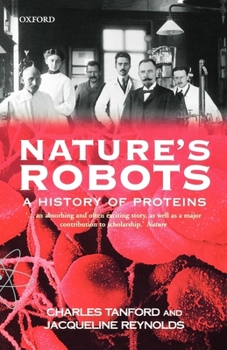Nature's Robots: A History of Proteins
Select Format
Select Condition 
Book Overview
Proteins are amazing molecules. They spark the chemical reactions that form the basis for life, transmit signals in the body, identify and kill foreign invaders, form the engines that make us move, record visual images. For every task in a living organism, there is a protein designed to carry it out.
Nature's Robots is an authoritative history of protein science, from the earliest research in the nineteenth century to the most recent findings...
Format:Paperback
Language:English
ISBN:019860694X
ISBN13:9780198606949
Release Date:January 2004
Publisher:OUP Oxford
Length:320 Pages
Weight:0.48 lbs.
Dimensions:0.7" x 5.0" x 7.7"
Customer Reviews
3 ratings
History of Science at its best
Published by Thriftbooks.com User , 21 years ago
People who say that History of Science is boring haven't read this excellent book. This book is lively, entertaining and unbiased. While you can find dozens of accounts of the history of chemistry or physics, protein biochemistry has been overlooked for way too long. It was worth the wait though! As the proud owner of some of the material cited in this book (particularly on the history of enzymes), I had a blast reading "Nature's Robots". Read it and then go out and buy "Mendeleyeff's dream", they complement each other beautifully
The definitive history of proteins
Published by Thriftbooks.com User , 22 years ago
This book represents the very best kind of science writing: tart, concise, erudite and eclectically well informed. Granted, this book is not aimed at the average reader, you must have a fairly good working knowledge of protein chemistry. Indeed, the authors explicitly state that this book is meant for young researchers in the field of proteins (me): it can get very technical in places. The authors hope to plug a lacuna in the knowledge of proteins that is not taught in universities for very good reasons. History often makes the learning of new concepts difficult (although there are equally good reasons for teaching it - re. the Mach-Maxwell debate in the teaching of physics in Germany in the nineteenth century).The authors have found the most marvellous materials - obscure researchers, long-forgotten debates, the wonder of discoveries as it was felt at the time. Indeed, what makes the book come alive is that discoveries are described in the context that they were made - both in terms of alternatives and the fractious infighting they sometimes engendered. Here, an appreciation of the technical details is an absolute must to truly appreciate the writing.Historical context is judiciously included. When it is necessary, for instance, to understand how certain labs came into prominence or how ideas criss-crossed the globe. However, historical context is not slavishly used to structure the book. Some discoveries logically engender other discoveries. Too much focus on the historical context would lose the thread of the ideas. There are some of the most delicately rendered biographies, although thankfully, these are only kept at a minimum, a couple of paragraphs or so - after all, most scientists are not that interesting as people.Finally, the authors have held no punches. In one place, they dismiss the work of a Nobel prize winner after winning the prize as a waste of time.However, one vital ommision must be said (as noted in the review of this book in Nature). The Nobel-prize winning work of Anfinsen in showing that denatured proteins can refold is reduced to a single footnote. Given the generosity they have shown in other places, this is suprising.
A Sketch Of Protein Research
Published by Thriftbooks.com User , 22 years ago
This volume concerns itself with the nature of proteins, from early crystallization and spectroscopy studies to the debate between whether proteins are colloids or macromolecules, and the discovery of the peptide bond. Methods of analysis are discussed in regards to their historical context, and many researchers are given due credit in their various efforts, some counter-productive. Much of the text is given to protein structure and folding and how research has illuminated these areas. There are also chapters on physiological functions and how proteins are synthesized and the discovery of DNA and it's significance, all in historical review. Current protein research is briefly mentioned, and there are many references cited throughout the volume. This book is primarily targeted to chemists although anyone with an interest in protein science could read it. I personally thought this book was very informative.




